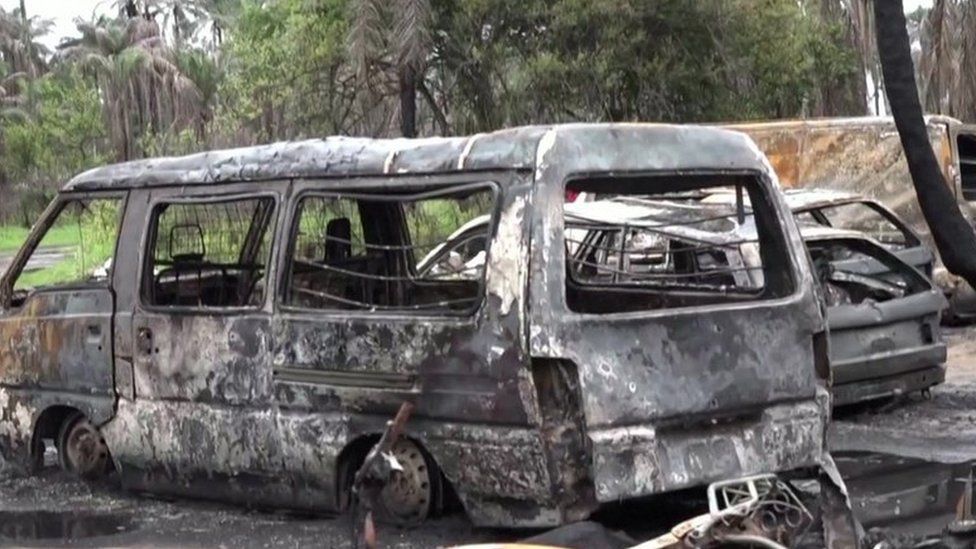Aliko Dangote to the rescue as Africa’s largest oil refinery starts production in Nigeria

Police officers stand at a section of Dangote Petroleum Refinery Petrochemicals in Lagos, on May 22, 2023. Nigerian President Muhammadu Buhari has inaugurated Dangote Petroleum Refinery and Petrochemicals, the largest single-train refinery in the world with 650,000 barrels per day refining capacity.
The $18.5 billion Dangote Petroleum Refinery has commenced production, a major achievement that is expected to take Nigeria out of the current quagmire of massive importation of petroleum products.
The refinery, which occupies 2,635 hectares of land in the Lekki Economic Free Zone in Lagos and has a capacity to process 650,000 barrels of oil per day, began producing diesel, kerosene and aviation fuel on January 12.
Mr Anthony Chiejina, Group, Head, Corporate Communications of Dangote Group, confirmed the commencement of production in a statement on Friday, quoting the President of Dangote Group, Mr Aliko Dangote, as thanking President Bola Tinubu for his support and encouragement.
Dangote said: “We have started the production of diesel and aviation fuel, and the products will be in the market before the end of the month. This is a big day for Nigeria. We are delighted to have reached this significant milestone.”
At the inauguration of the refinery in May last year, Mr Dangote emphasised the refinery’s role in fulfilling the group’s corporate vision of promoting self-sufficiency and global competitiveness.
The refinery which would go into full production later in the year, is designed to meet the highest quality standards and high-value products.
“Once our plant is fully on stream, we expect that at least 40 per cent of the capacity will be available for export and this will result in significant Foreign Exchange inflows into the country.
According to him, the accomplishment is to enable Nigeria to eliminate what he described as the tragedy of import dependency and stop substandard petroleum products from being dumped in Nigeria’s market.
“Beyond this, we intend to ensure that our plants are run at the highest capacity of utilisation and the highest efficiency to enable us to export competitively to other markets,” he added.
He said the project was the realisation of a “clear opportunity” for Nigeria, citing the African Union’s commitment to the creation of an African common market through the African Continental Free Trade Area (AfCFTA).
Nigeria could save up to $10 billion in foreign exchange and generate another $10 billion in exports with the commencement of the refinery, he said.
The refinery, which was initially estimated to cost about $9 billion when it was conceived in 2013, was completed with a total of $19.5 billion with funding distributed into 50 per cent equity investment and 50 per cent debt finance.
Completion of the project
Former President Muhammadu Buhari who inaugurated the refinery a few days before leaving office on May 29, 2023, said the facility would serve the local market and also pump products to neighbouring countries of Chad, Niger, Cameroon, Benin, Togo and Ghana.
Mr Buhari described the completion of the project as a significant milestone for Nigeria’s economy and a game changer for the downstream petroleum products market in the entire African region.
“We must create necessary conditions for our private sector to grow and partner with the public sector to accelerate economic growth across the continent. We must not allow outside powers to use some of our leaders to destabilise our economic and political trajectory,” he said.
Nigeria which started crude oil production in 1951 is one of the world’s major crude oil and gas producers, a major exporter of crude oil and unfortunately also a major importer of refined petroleum products.
It remained import-dependent because its four state-owned refineries – in Warri, Port Harcourt and Kaduna - had been grounded for more than two decades.
The refinery with a staff strength of more than 129,000, is designed to produce about 50 million litres of petrol daily; and yearly production of 10.4 million tonnes of gasoline, 4.6 million tonnes of diesel, and 4 million tons of jet fuel a year.





